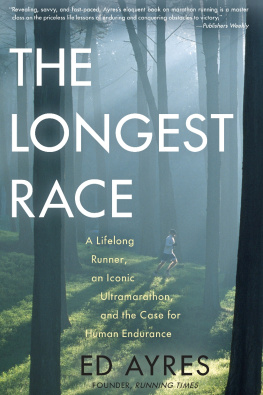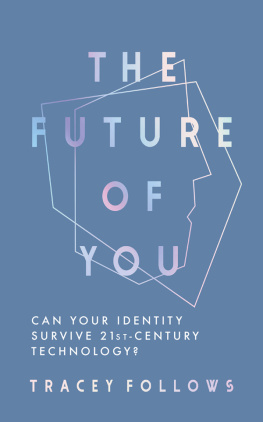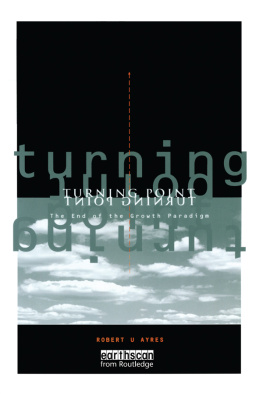First published 2016 by Transaction Publishers
Published 2017 by Routledge
2 Park Square, Milton Park, Abingdon, Oxon OX14 4RN
711 Third Avenue, New York, NY 10017, USA
Routledge is an imprint of the Taylor & Francis Group, an informa business
Copyright 2016 by Taylor & Francis.
All rights reserved. No part of this book may be reprinted or reproduced or utilised in any form or by any electronic, mechanical, or other means, now known or hereafter invented, including photocopying and recording, or in any information storage or retrieval system, without permission in writing from the publishers.
Notice:
Product or corporate names may be trademarks or registered trademarks, and are used only for identification and explanation without intent to infringe.
Library of Congress Catalog Number: 2015045765
Library of Congress Cataloging-in-Publication Data
Names: Ayres, Ed, author.
Title: Defying dystopia : going on with the human journey after
technology fails us / Ed Ayres.
Description: New Brunswick (U.S.A.) : Transaction Publishers, [2016] |
Includes bibliographical references.
Identifiers: LCCN 2015045765 (print) | LCCN 2015050240 (ebook) |
ISBN 9781412862707 (hardcover : acid-free paper) | ISBN 9781412863230 (pbk. : acid-free paper) | ISBN 9781412862202 (ebook)
Subjects: LCSH: Technology--Social aspects. | Social psychlogy.
Resilience | (Personality trait)
Classification: LCC T14.5 .A985 2016 (print) | LCC T14.5 (ebook) |
DDC 303.48/3--dc23
LC record available at http://lccn.loc.gov/2015045765
ISBN 13: 978-1-4128-6270-7 (hbk)
ISBN 13: 978-1-4128-6323-0 (pbk)
On a cool November morning in 1992, I was sitting in my office at the Worldwatch Institute in Washington, DC, sorting through the usual heap of correspondence, clippings, and notes on my desk and trying not to knock over my coffee. I didnt know then that just a few years later, along with sorting paper, Id have to wade through the mornings avalanche of e-maila technology that was good to have but that also seemed at times to be the digital equivalent of the guy on the corner opening his raincoat to offer dirty pictures and cheap drugs.
My office was a few feet down the corridor from the corner office of Lester R. Brown, who had founded Worldwatch as the worlds first international environmental research group. Across the street from Lesters window was the Brookings Institute, where policy experts did research for presidents and senators, and where you could often see a TV crew interviewing one of the senior associates on the lawn out front, under a great old cherry treea tree that, when it bloomed every spring, was one of the joys of Lester Browns life. From my window, I could see the roof patio of Planned Parenthoods national headquarters next door, where members of the embattled organizations staff often came out for a break. Half a block away was Dupont Circle, where the iconic bookstore Second Story Books often had a sidewalk bin where you could search for old treasures. Our building, 1776 Massachusetts Avenue, was on a leafy block that housed a score of nonprofits, think tanks, and grad-school annexes where bright young people could work with eminent greybeards.
Lester had recently hired me to edit the Institutes bi-monthly magazine, WorldWatch, and that morning I was just getting focused on priorities for the next issue when our mail-room guy came in and handed me a press release. It was from the Cambridge, Massachusetts-based Union of Concerned Scientists. For a moment, when I glanced at it, I was reminded of a forlorn-looking man Id seen standing on the sidewalk a few days before, holding a hand-lettered cardboard sign announcing the End of the World. But as I looked more closely, I saw that the press release contained a statement that had been signed by 104 Nobel Prize winners in the sciences, along with more than 1,500 other senior scientists from 71 countries. A Threat to Human Survival, read the headline. The statement read:
We the undersigned senior members of the worlds scientific community, hereby warn all humanity of what lies ahead. A great change in the stewardship of the earth and life on it is required if vast human misery is to be avoided and our global home on this planet is not to be irretrievably mutilated.... Humans and the natural world are on a collision course.
Among the signers were the renowned astrophysicists Carl Sagan and Stephen Hawking, evolutionary biologists Stephen Jay Gould, Edward O. Wilson, and Lynn Margulis, population biologist Paul Ehrlich, anthropologist Sarah Hrdy, economist Wassily Leontief, chemist Linus Pauling, DNA pioneer James Watson (co-discoverer of the double helix structure), and astronomer James Van Allen (for whom the Van Allen Belt around the earth is named).
For the public of the early 90s, the World Scientists Warning to Humanity might have been quite a shock, even if a bit euphemistic (the wording had to have been acceptable to more than 1,500 strong-minded scientists in multiple disciplines, all of whom must have known their reputations could be at stake). It didnt use inflammatory language, like possible end of civilization, but the implications were unmistakable. To me, it seemed quite arguably one of the most important documents ever issued. But as things turned out, most of the public never heard about it.
The day after the release was distributed to the media, it seems not to have been reported in a single US newspaperat least not that I could find any record of. A front-page story in the New York Times that day recounted the struggle of a Muslim family to survive in war-torn Sarajevo. But the struggle of all humanity, present and future, to survive on an ecologically torn planet? Nothing. Later, when asked, the Times editors said they had considered the story not newsworthy. The same perplexing response was offered by the Washington Post. For reasons that would mystify me even years later, the World Scientists Warning to Humanity had been stonewalled.
Maybe what the Times and other papers meant about the document being not newsworthy was that it did not contain new research findings; it simply pulled together the broad implications of some very arresting work that had been done over the previous few years but that had been largely ignored by politicians and media. Many of the signers were nuclear physicists, who for years had been maintaining a Doomsday Clock showing just how close, in their collective judgment, we had come to the unleashing of nuclear holocaust. Their annual assessments had been treated by reporters as a soft-news item on a par with the predictions of Punxsutawney Phil on Groundhog Day. Many other signers were climate scientists, who two years earlier had issued the first consensus report of the Intergovernmental Panel on Climate Change (IPCC)the first major warning of approaching climate change. Their report had been so heavily disputed by fossil-fuel industry publicists and lobbyists that polls showed the public to be fairly confused and uncertain about whether human-caused global warmingor any global warming at allwas occurring. Others of the signers were concerned about the well-documented history of powerful new technologies being rushed into service and then producing unintended consequences that were too often catastrophic. By the 90s, wed reached a point where new technology was coming on line far faster than its impacts could be assessed.









